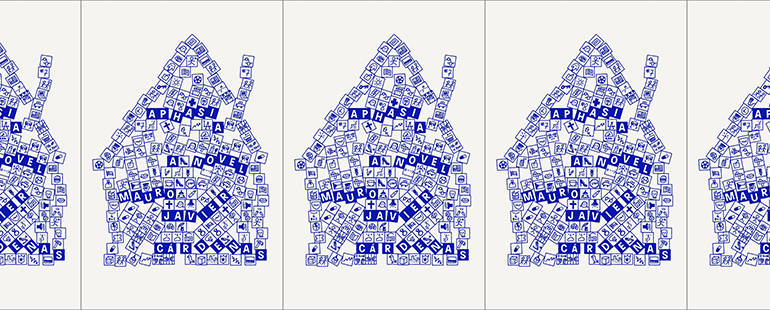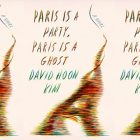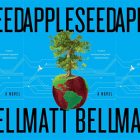“What are the conditions of contemplation to exist in an alien planet?”: An Interview with Mauro Javier Cárdenas

The first thing you notice when you pick up Mauro Javier Cárdenas’s second novel, Aphasia, published in November 2020, is the sentences. Long, sinuous sentences, most of them pages long, abounding with interruptions, digressions, leaps in time, and triangulated conversations with imagined or absent third parties.
The second thing you might notice is a certain polemical character. Aphasia situates itself catacorner to a number of trends in contemporary literature. Rejecting the pacific tone of much American writing, the book bristles with arguments, aesthetic judgments, enthusiasms couched as criticisms, and pronouncements about the state of “so-called fictions” in our contemporary world. It wears its aesthetic allegiances on its sleeve; Aphasia’s lead character Antonio constantly filters his experiences through the artists he loves, from writers like António Lobo Antunes, László Krasznahorkai, and Samuel Beckett, to modernist composers like Olivier Messiaen and Arvo Pärt. In the process, Aphasia constructs something of an idiosyncratic counter-canon of staunch avant-gardists, among which it proudly plants its flag.
To earn a place in Antonio’s canon, it seems, art should be driven by an effort to represent the slipstream of consciousness, not by coercive mechanisms like suspense or plot. But Aphasia is not a plotless novel. Early in the book, readers discover that Antonio’s sister Estela has gone missing after suffering something resembling a schizophrenic breakdown—she’s become convinced she’s under constant surveillance and in direct communication with Barack Obama, the CIA, and the Pentagon. After skipping a mandatory court hearing in Baltimore, she’s now on the run, last heard from somewhere outside Milwaukee. Although Antonio is being hounded by her bail bondsman, to whom he owes a large sum of money, when he does manage to locate Estela, she’ll be threatened with deportation back to the siblings’ abusive extended family in Colombia.
The book’s structure emerges through the stream of associations and diversions that enter Antonio’s head as he goes about his daily routine in Los Angeles—working as a database analyst at Prudential Investments and raising two children with his ex-girlfriend Ida—while doing everything in his power not to think about his missing sister. Some of Antonio’s diversions include experimental music concerts, sci-fi stories written by ex-girlfriends, a series of online dates with women looking for a “sugar daddy,” and circuitous efforts to understand his sister by transcribing conversations he has recorded with his mom about their childhood in Bogotá. Reading Aphasia and its intricately patterned sentences that circle obsessively around an absent center, it’s hard to shake the feeling that Cárdenas has done something remarkable, inventing an entirely original language for representing the fractured sensation of being conscious in the twenty-first century.
Aphasia is Cárdenas’s second novel, part one of what he has called his “American trilogy.” His first novel, The Revolutionaries Try Again, from 2017, examines a circle of Antonio’s childhood friends from an elite Jesuit boys school who experiment with migration and political revolution (in the first novel, Antonio, like Cárdenas himself, hails from Ecuador, not Colombia). According to Cárdenas, his third novel, American Abductions, as yet unpublished, will focus on the experience of deportation and separation from the standpoint of Antonio’s daughters.
Rob Madole: The critic Dustin Illingworth selected you as his first interview for a Substack dedicated to “anti-realist fiction,” where he reassesses the work of writers like David Markson and Witold Gombrowicz. In the interview, you describe your antipathy to “traditional realism,” which you say replicates the “same narrative conventions that companies have repurposed” to sell consumer products. How do you define traditional realism? Is Aphasia an anti-realist book?
Mauro Javier Cárdenas: I don’t think debating shorthand is too entertaining—traditional realism being shorthand for a set of boring narrative conventions, anti-realism being Dustin’s shorthand for the formalist fictions of interior representation he prefers, which are the same kind of fictions I prefer—so let me answer your question by focusing instead on what I think I’ve learned from David Markson, the first author in Dustin’s Excellent Anti-Realism Adventure.
Markson removed almost everything from the novel so that he could focus on his preference: to fiddle with his favorite passages from hundreds of books. I have tried to remove almost everything from the novel so I can focus on my preferences: the representation of altered minds. Their delusions, imaginary dialogues, recasted memories, etc. Markson trusts that readers will follow his barely visible patterns, whereas in Aphasia the patterns, how a passage connects to a subsequent passage, are more visible, although they come at you faster than in Markson. Patterning is exciting to me. In Aphasia, I did not know, for instance, that Antonio reading a story called “Parallel Longings,” which is written in the form of a Q&A with the chatbot of a detective agency called Parallel Longings, which clients hire to investigate what happens in their parallel lives, will yield passages from Correction by Thomas Bernhard, from “Gooseberries” by Anton Chekhov, and from “Symbols and Signs” by Nabokov.
RM: Experimental music plays a big role in Aphasia. Every morning, before beginning work as an SQL engineer at Prudential Investments, Antonio listens to a playlist featuring artists like Olivier Messiaen and Steve Reich while struggling to write what he calls his “so-called fictions.” These often include transcribed recordings he has made of his friends and family. Do you see a kinship with modernist composers, whose music often emphasizes the compositional process over its harmonic results? What is the influence of experimental music on your writing?
MJC: What are the conditions of contemplation to exist in an alien planet? I’ve (not that) often asked myself. In other words if my fictions consist of impulses which I try to exhaust by free association, what are the conditions of contemplation so that these free associations don’t become a loop of commonplaces, in other words if I am a simple input/output mechanism, and free association equates to a continuous input/output that only differs from the more linear approach of progression in the angle of linkage between input/output, perhaps free association isn’t as liberating as I thought, in other words to exist in an alien planet equates to attempting to destabilize my input/output, which I like to believe I’ve been able to do—otherwise it would be quite hopeless—two hours at a time at concert halls where I’ve been able to hear the alien progressions of Ligeti, Messiaen, Cage, Nancarrow, and, to be specific to Aphasia, my second novel, “Aphasia” by Mark Applebaum, which I first heard in the back of Davies Symphony Hall in San Francisco in 2015. I can’t listen to the aforementioned composers while I am writing, by the way, but I do listen to Steve Reich on repeat while I am writing. I like to believe the impulses in my sentences mirror the impulses in his music.
RM: At the same time, Aphasia seems to have a deep dramatic and emotional grounding, rooted in Antonio’s efforts to be a good father to his two daughters, Ada and Eva, while locating his sister, Estela. Under its experimental hood, that is to say, I felt that the novel had a propulsive engine of characterization and plot. How do you square this circle? Are characterization and plot simply things that “result” from your process?
MJC: “I used to love formalists in college,” says the cliché made in USA, “but when I wanted to write about what was important to me, you know, my feelings, I switched to writing the conventional novels my fellow Americans like to celebrate.” I love this cliché—by which I mean I hate this cliché—because it summarizes a few wrongheaded assumptions about fiction: one, that formalists are immature; two, that conventionalists are manure; three, that formalism and the representation of emotions are at odds with one another. I don’t start my novels by thinking what will I formally do to my lab rats today—nevertheless do please pre-order Lab Rats: A Formaldehydic Novel—but I do start them by thinking What are my characters thinking about today? The verb to think is mostly associated with cerebration, and cerebration is not often associated with emotions, whereas to me the representation of “to think” includes everything that’s alive for a character in a specific interval of time, including his emotions. The story “Break it Down” by Lydia Davis is a great short example of the representation of cerebrated emotions—a man tries to break down how much he spent on someone he loved—and a longer example is of course Aphasia.
In terms of plot and characterization, there’s a difference between focusing a novel on whether Antonio will or will not help his sister—this type of novel would have begun with Antonio finding out his sister has skipped her trial proceedings and has gone missing (the conflict), followed by Antonio searching for her (the action), etc.—and focusing a novel on what would it be like for a character like Antonio to exist within an interval of time in which his sister, who has lost her ability to distinguish between what’s inside/outside her mind, has skipped her trial proceedings and has gone missing. In the first type of novel the representation of what goes on in Antonio’s mind would have been limited by his actions—there’s an essay by Stanley Elkin called “Plot” that illustrates this point at length—whereas in the second type of novel Antonio’s mind can exist amply in that interval of time.
RM: You have a quantitative background from Stanford and you currently manage an AI model development team. You’ve said that “the only truly experimental literature of the twenty-first century [will be] that which plays with algorithms.” A century from now, when AI writing systems are far more advanced, what will human writing look like?
MJC: Putting aside my pessimism about the future of the human race, the future of human writing could consist on the one hand of AI entrepreneurs hiring conventional novelists as input farms so that their narrative machines can output premium fictions, and on the other hand it could consist of nonconventional novelists either studying neural networks or partnering with those who study neural networks so that they can discover ingenious ways to interact with the output of their neural networks, as Trevor Paglen has already done in visual art with his “Hallucinations,” for instance, which leverages Adversarial Machine learning—in American Abductions, my third novel, a robot nurse called Rob Ott entertains a human called Not Roberto Bolaño by playing a guessing game on what comes next in passages generated by a narrative continuity algorithm developed by Melissa Roemmele from Stanford—and the machines will force these novelists to either wonder or verify if what they’ve written could have been generated by the machines, and this will push them to generate great literature, too.



